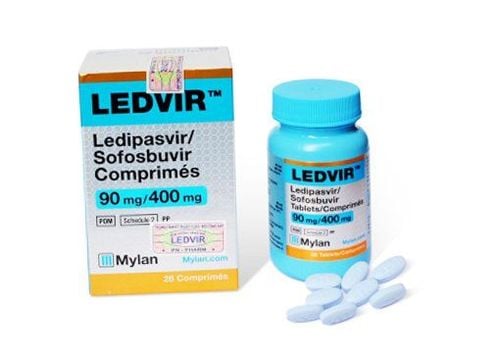This is an automatically translated article.
Ribatagin belongs to the group of anti-parasitic, anti-infective, anti-viral, anti-fungal drugs that inhibit the RNA messenger, prevent the replication of the virus and stop the infection. Let's learn about the uses and notes when using Ribatagin through the article below.1. What is Ribatagin?
Ribatagin medicine contains the active ingredient Ribavirin 400mg and excipients just enough for 1 tablet. The drug is prepared for users in the form of hard capsules and is packaged in boxes of 2 blisters x 10 tablets.
2. Uses of Ribatagin
Ribatagin is indicated for the treatment of patients infected with the following diseases:
Hepatitis A, B, C caused by viruses, Herpes zoster, herpes simplex. Viral diseases in children: Measles, mumps, chickenpox, respiratory syncytial. Contraindicated to use Ribatagin 400 in the following cases:
Patients with hypersensitivity to Ribavirin or any ingredient in the drug. Pregnant and lactating women. The patient has a history of unstable heart disease, ischemic heart disease, uncontrolled or unstable heart disease in the last 6 months. Patients with chronic renal failure, with creatinine clearance < 50ml/min or patients on dialysis. Patients with severe liver failure or decompensated cirrhosis. Patients with anemia or hemoglobin infection. Patients with a history of psychiatric disorders or mental disorders such as depression.
3. Dosage and how to use Ribatagin
The drug is made in the form of hard capsules, so it should be taken orally. The recommended dosage when using Ribatagin is as follows:
Patients with hepatitis A: Take 800mg/day, divided into several times and use continuously for about 10-14 days. Patients with hepatitis B and C: orally 800 - 1200 mg/day, divided into 3 - 4 times and drink continuously for a period of 6 months - 1 year. People infected with Herpes zoster/ simplex virus: take 800-1200mg/divide 3-4 times/day and drink continuously for 7-10 days. Prophylaxis of recurrence of genital herpes: 400mg / divided 1-2 times / day and taken continuously for 6 months. Note: The above recommended therapeutic dosage for Ribatagin is for reference only. Therefore, users need to take the drug as prescribed by the doctor to achieve the best effect and safety for the user.
Management of missed dose:
If you miss a dose, you can take it within 1-2 hours compared to the indicated in the prescription. However, if the time is too far from the time when you need to take the medicine, you should not make up for it or arbitrarily double the dose, but proceed to take the next dose as indicated. It is important to follow the correct prescription or consult your doctor if you want to change the dose.
Treatment of overdose:
After taking the drug, if you see strange symptoms, stop using the drug immediately and notify a qualified doctor or pharmacist to diagnose the condition. sick.
4. Side effects of the drug Ribatagin
In addition to the main effects of the drug, during use, users may encounter unwanted side effects as follows:
Common symptoms:
Headache, fatigue, tremor, fever, muscle weakness, weight loss. Anemia, neutropenia, thrombocytopenia. Nausea, loss of appetite, abdominal pain, diarrhea. Bleeding gums, mouth ulcers, dry mouth. Fast heart rate, increased or decreased blood pressure. Muscle pain, joint pain. Depression, irritability, decreased concentration. Pharyngitis, rhinitis, sinusitis, shortness of breath, chest pain. Taste disturbance, tinnitus, hearing loss. Menstrual disorders, hypothyroidism or hyperthyroidism. Uncommon symptoms:
Presence of psychiatric symptoms such as suicidal ideation. Rare symptoms:
Hemolytic anemia. Bronchospasm in people with a history of asthma. Severely progressive interstitial pneumonia. Inflammation of the eye membrane. Note: During the use of Ribatagin 400, if the patient appears to have any of the above-mentioned side effects or any other unusual symptoms, they should stop taking the drug and go to the nearest medical facility center for treatment. diagnosed and consulted by a medical professional.
5. Ribatagin drug interactions
During the use of the drug, there may be an interaction between Ribatagin with food or other drugs and functional foods, affecting the absorption of the drug as follows:
Amount of HIV in the blood may be increased because ribavirin inhibits the in vitro mediated phosphorylation of zidovudine and stavudine. Phosphorylated derivatives of purine-type nucleotides may be elevated by ribavirin and may increase the risk of lactic acidosis induced by these drugs. Concomitant use of Ribavirin with Amphotericin, Stavudin, Primaquin may cause ADR teeth and increase blood toxicity. It should not be used in combination with Didanosin because it may increase the concentration of Didanosin in the cell, increasing toxicity to the mitochondria. Co-administration of ribavirin and zidovudine inhibits the phosphorylation of zidovudine to an active form that increases ADR; the combination of these two drugs should not be used. Co-administration with certain aluminum-containing antacids and simethicone reduces the AUC for Ribavirin. Note: In order to avoid adverse drug interactions for the user, patients should fully list functional foods and drugs being used simultaneously with Ribatagin so that doctors and pharmacists can advise exact question.
6. Some notes when using Ribatagin
Be careful when using the drug for patients under 18 years old because the effect and safety of the drug at this age are unknown. Do not use monotherapy due to ineffectiveness in the treatment of hepatitis C. Ribavirin should be used with caution in patients with a history of psychiatric disorders, especially major depression, and in patients with diffuse cirrhosis. or severe renal failure. Before using the drug, the patient should have a blood test, monitor for anemia because Ribavirin can cause hemolytic anemia, which can worsen heart disease. Do not use the drug for pregnant women, because Ribavirin is toxic to the fetus and can cause teratogenicity. Before taking the drug, it is necessary to check that the woman is not pregnant. To avoid side effects of the drug on the baby, women who are breastfeeding should not use the drug. The basic information about Ribatagin in the above article is for reference only. Users should not arbitrarily use the drug, but need to contact a specialist to have a suitable prescription and ensure safety for users.













